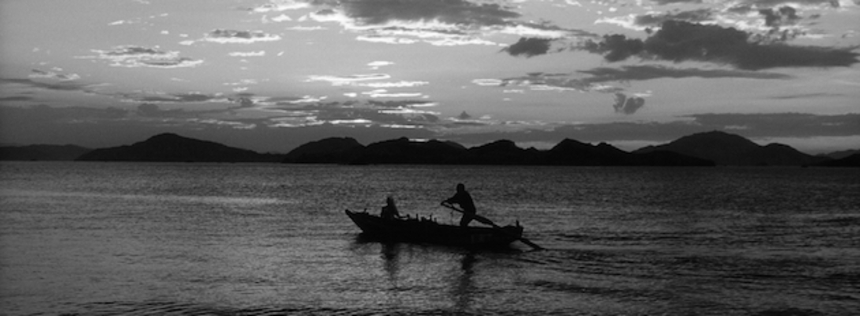Blu-ray Review: I Can Think Of At Least One Thing Wrong With The Title Of Shindo Kaneto's THE NAKED ISLAND

Simpsons jokes and expectations of foreign film exoticism notwithstanding, Shindo Kaneto's 1960 film The Naked Island has arrived on Blu-ray by way of the Criterion Collection (spine #811). Shindo's follow-up to that film, Onibaba, remains one of my favourite movies from the Criterion label, so I was eager to check out this title - which parallels, and also departs from, his other work in unique ways.
The Naked Island concerns a small Japanese farming family whose tract of land is the meagre island of the title. A bald patch stuck rudely in the middle of a bay, the island has no fresh water source, so the mother and father spend their days rowing to the mainland, bringing back buckets of water, and irrigating their crop.
They have two boys who pass their days half in school, half spear-fishing to eke out the family's modest income. (Snaring a huge fish alive, and the financial rewards it brings, is cause for a day trip for the family to the nearby city, which becomes the first moment, quite late in the film, when we might fully realize that The Naked Island is not a period piece, but set firmly in post-war Japan.)
Unsurprisingly then, this is a harsh, difficult life. The family subsists, wrapped in coils of tension so suffocating that an accident as trivial as dropping a water bucket is a life-threatening mistake.
What makes The Naked Island particularly interesting, though, qualifies as a huge "Your Mileage May Vary" in terms of an audience's interest: there is no plot to speak of. (The aforementioned dropping of a bucket is about as substantial an "event" as takes place in the first half of the film - and the violent, visceral reaction to that event, coming in the midst of so much peace and quiet, will get a gasp out of any audience member.) While it would be going too far to call The Naked Island a staged documentary, it has documentary inclinations in its veins, and sketches out only the barest concept of a story structure to hang its 96-minute frame on. As a piece of cinema, it's almost wholly interested in something else.
It patiently, and in many cases beautifully, captures the painstaking rhythms of these peoples' lives. It absorbs itself in the sensations of an oar undulating back and forth in the water, or the sweat on the foreheads of the farmers as they work the land. The film takes place almost entirely without dialogue - a sheep bleated at one point and I nearly jumped out of my seat - and is a poem instead built on sound design, exquisite photography, and Hayashi Hikaru's rich score.
This might not make much of an impression on you, then, unless you have a pervading interest in the way wind moves over sun-baked rocks, or how water soaks into the soil when poured at the root of a growing crop. I do, actually - I've had a lifelong fixation on the play of water and earth, and when I was a kid I nearly destroyed my parents' garden with overwatering - so some of the shots in The Naked Island literally produced an ASMR reaction in me. That was weird, but I liked it.
By the end, The Naked Island's essential, stripped-down format bears fruit. The hardships and cadence of these peoples' lives - we are with them for more than a year - get into an attentive viewer's bones. I began to wonder how the human race has survived this long; not because we're idiots (though we are), but only because we're so fragile, and life on this planet is so relentlessly hard.
The presentation, from a technical perspective, is superb. It occurred to me recently that digital film restoration technology has improved to the point where, arguably, we'll never see a scratchy, dusty old movie again - unless intentionally, or because existing prints are so damaged that even computers can't sort them out. But I watched The Naked Island and La Dolce Vita this week, both from 1960 and both from the Criterion Collection, and both films were stunning. There isn't a frame of The Naked Island that doesn't look like it could have been shot last year on a somewhat outdated film stock. Only the latitudes and grain structure of older stocks remain as signposts of the years in which they were used.
Extras are excellent on the disc as well. A rarity for older Criterion films, there is a commentary track by the director himself, recorded in 2000 in Japanese (with subtitles), where he and composer Hayashi Hikaru discuss the film in great detail. Shindo lived to be over a hundred, so there is also a video segment of him introducing the film in 2011, when he was 99.
The most unexpected entry in the supplements: a 7-minute interview with Benicio Del Toro, for no reason other than he's a big, big fan. He talks about the film and about Shindo's work with infectious, chatterbox enthusiasm.
The Naked Island
Director(s)
- Kaneto Shindô
Writer(s)
- Kaneto Shindô
Cast
- Nobuko Otowa
- Taiji Tonoyama
- Shinji Tanaka
- Masanori Horimoto







